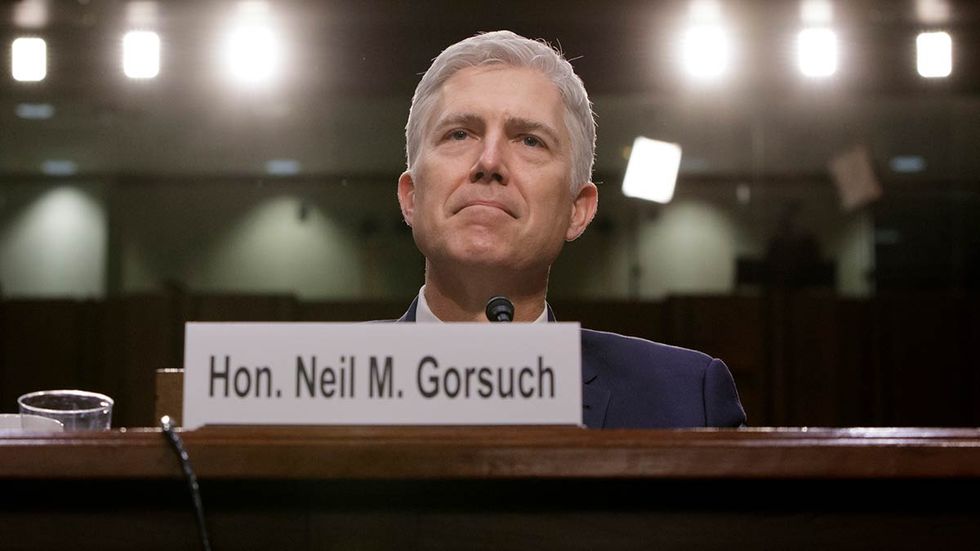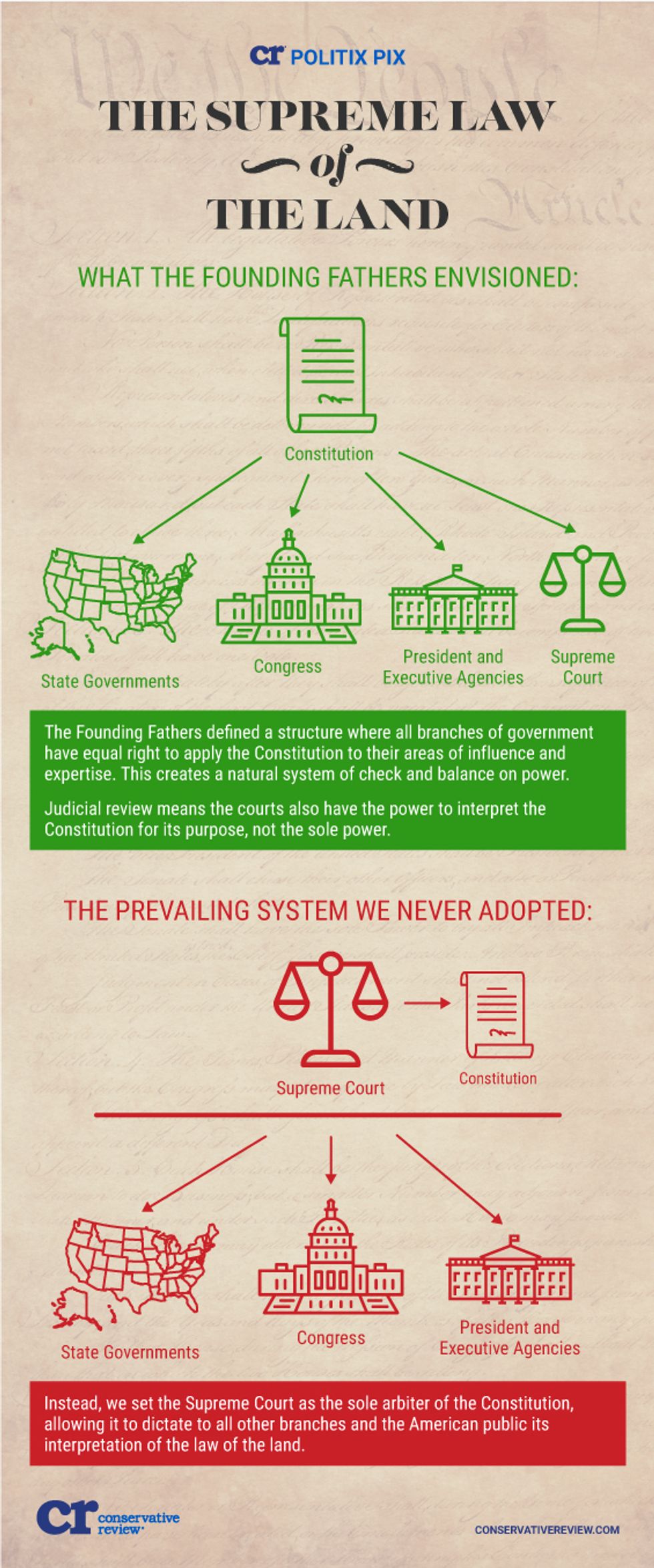
© 2024 Blaze Media LLC. All rights reserved.
Imagine if a constitutional crisis had developed throughout the past half century whereby the speaker of the House and the Senate majority leader would direct their own “legislative” military outside of the real military controlled by the president. To continue the hypothetical, this military would operate anywhere throughout the world or even within our borders. It would be controlled by a command panel selected by the president and confirmed by the Senate every time a vacancy arises, but ultimately controlled by congressional leaders. Imagine those confirmation hearings dealing with specific questions about military policy without getting any clear answers on mission objectives and without, more fundamentally, anyone shouting out that the entire premise of a legislative army is an anathema to our entire of government in the first place.
For those who missed the confirmation hearing of Judge Neil Gorsuch, that essentially describes the scene in this constitutional crisis that rivals the one in my hypothetical example. This entire hearing, like every Supreme Court confirmation hearing in recent years, failed to speak to the enormity of the constitutional crisis confronting us with judicial supremacy.
Judge Gorsuch should have been asked a single question: Which system of governance did we adopt in 1789 — the top part of this graphic or the bottom? Who is the sole and final arbiter of the Constitution?
Instead, we got platitudes. Except the difference between Republican and Democrat nominees is this: Whereas Democrats know the outcomes of their nominees, we are not entitled to know where our nominees stand on critical issues, even when the Constitution is clear as day. They are the sole and final arbiters of the Constitution, but we have no sense of what they believe on almost any clause. Worse, with Judge Gorsuch essentially saying Obergefell is “absolutely” settled law, I think we do know where he stands.
And therein lies the problem. We have courts that have declared war on this country’s Constitution, traditions, history, and society, and have declared themselves sole and final arbiter every political issue. For a “conservative” judge to say that the redefinition of marriage, which in itself overturned reams of settled law and natural law, is somehow “absolutely” settled law embodies the reality we already knew: The entire legal profession and judiciary, including the “conservative” side, is irremediably broken.
Only anti-Constitutional precedent is settled
During a line of questioning with the repugnant and rude Sen. Al Franken (D-Minn.), Gorsuch said that redefinition of marriage is “absolutely settled law,” but just that he wouldn’t comment further because “there is ongoing litigation about its impact and its application right now.” And while Gorsuch used the term “precedent” instead of “settled law” to describe Roe, he added that “[W]hat was once a hotly contested issue is no longer a hotly contested issue. We move forward.” Also, in one of the more memorable moments of the hearing, he passionately said that he would have walked out the door had Trump asked him if he’d overturn Roe.
Now, obviously nominees never talk about pending cases, but if we can’t have any assurance on a past case that is an abomination to every facet of the Constitution, then where is the assurance?
Folks, this is why I wrote “Stolen Sovereignty” — to dissent from the broader “conservative” legal movement that thinks we can fix this broken system of judicial supremacy with “better” judges. Among the 12 reasons I cite for why the judiciary is irremediably broken is that stare decisis is one-directional and a dead-end for conservatives. Liberals could blow up the most settled area of law with the flick of the wrist, as they have done with marriage and immigration, yet once they do so once, conservative judges treat that as “absolutely” settled law.
Some conservative supporters of Gorsuch might grouse at this criticism. “Daniel, we can’t afford to have a nominee be that blunt, he won’t get confirmed.”
Well, if we are at the point at which a conservative nominee can’t be clear on Roe and Obergefell the same way a liberal nominee is, even when we have a GOP Senate, the entire notion of fixing the courts by “picking better judges” is dead. What about Judge Gorsuch’s answers would give us more confidence he is with us than Roberts was at his confirmation hearings? At least Justice Alito didn’t take the bait at the time, and in fact, we knew from his work in the Reagan administration that he worked to fight Roe.
There is still no clarity from Gorsuch on where he stands on the 15 questions I posed when he was initially nominated, although some of them don’t look promising based on some of his statements. It would be fine for those questions to go unanswered if Democrats had the same problems with their nominees. But they don’t. Their nominees don’t treat Heller the same as ours do Obergefell, and in fact, their lower court nominees are chipping away at it every day, even though the right to bear arms is mentioned in the Constitution and marriage is not.
Moreover, it would be fine if we didn’t have litmus tests for nominees if we reverted to a time when the judiciary was the weakest branch, not a branch stronger than God. As CRS observes, most Supreme Court nominees were either voice voted or confirmed by unanimous consent for much of our history. By my count, 73 of the 114 nominees prior to 1965 were confirmed this way. Not surprisingly, since the courts crowned themselves king around the mid-20th century, confirmation fights have become more political. As I’ve noted before, if we want to take politics out of the process, we must take politics out of the court. But with the courts becoming a super legislator and only one side winning commitments, this was supposed to be our turn.
Yet, rather than hear any expression of dismay over judicial tyranny, we kept hearing a vacuous call both from senators and from the nominee for “an independent judiciary,” as if the judiciary is the branch of government on the ropes and in need of a stronger role. What about calls for independence of the other two branches from the judiciary? What is this business of not criticizing a judge who steals our sovereignty?
The bottom line is if we are going to have a super legislator deciding marriage, religious liberty, abortion, affirmative action, all election laws and redistricting, and the entire national sovereignty, you better believe we are going to demand litmus tests, especially with a GOP Senate. Obviously, you don’t want a judge to pre-judge a case, but we would want some understanding of how he views the constitutional clauses driving these cases.
I’d like to have as much confidence in Gorsuch on my 15, largely civilization issues, as libertarians feel they have on his opposition to the Chevron deference. And truth be told, the main source of his Chevron opposition he kept championing during the hearing was the Gutierrez-Brizuela v. Lynch case, which, in his words, protected the due process of “undocumented immigrants” (a term he kept using). In that case, I actually believe Scalia’s philosophy was correct to allow agencies a stronger pro-sovereignty interpretation when dealing with someone who was clearly here illegally.
Gorsuch will not save us from judicial hell. Then again, it’s not his job.
When I started writing my book warning that the judiciary has already crossed the point of no-return, I thought Scalia would still be on the court for many years. Scalia himself said the court was worse than ever with him on it, and that assessment didn’t factor in the irreversible crisis with the lower courts. Now that Gorsuch is clearly not on the same level as a Scalia (although it’s unclear where exactly he will land), it’s quite evident that the court will certainly not move to the right. The only path forward is judicial reform and an Article V convention of the states. The process for nominating lower court picks hasn’t even gotten off the ground yet, and there is almost no way we will find many of them with a confident paper trail. Besides, we have already lost most circuits for a generation (see here and here).
To be clear, this is not a criticism of Gorsuch as a person or a judge. By all accounts, he’s a charming, intelligent, fair, and genuinely decent man. It’s a criticism of the failure of our side to understand what we are up against with judicial tyranny and the remedies that are needed — now.
To be clear, this is not a criticism of Gorsuch as a person or a judge. By all accounts, he’s a charming, intelligent, fair, and genuinely decent man. It’s a criticism of the failure of our side to understand what we are up against with judicial tyranny and the remedies that are needed — now.
At some point, we must break outside of the existing paradigm. For the same reasons we have failed to “appoint better judges” and “move the judiciary to the right” until now, we will continue to do so in the future.
Want to leave a tip?
We answer to you. Help keep our content free of advertisers and big tech censorship by leaving a tip today.
Want to join the conversation?
Already a subscriber?
Blaze Podcast Host
Daniel Horowitz is the host of “Conservative Review with Daniel Horowitz” and a senior editor for Blaze News.
RMConservative
more stories
Sign up for the Blaze newsletter
By signing up, you agree to our Privacy Policy and Terms of Use, and agree to receive content that may sometimes include advertisements. You may opt out at any time.
© 2024 Blaze Media LLC. All rights reserved.
Get the stories that matter most delivered directly to your inbox.
By signing up, you agree to our Privacy Policy and Terms of Use, and agree to receive content that may sometimes include advertisements. You may opt out at any time.




